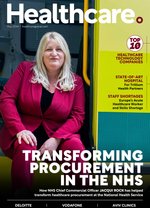The Future of Medical Imaging

Since the groundbreaking X-ray debuted in 1895, medical imaging has revolutionised patient care. From bulky ultrasound machines to today's pocket-sized devices linking up with smart devices, the landscape has evolved dramatically. This progression heralds a new era of accessibility and demand, transforming the way patients are diagnosed and treated.
Today’s medical imaging market is on a steady climb, with a compound annual growth rate of 6.2%. Currently worth $40.33bn it is expected to reach $61.51bn by 2033. But what does this mean for doctors, healthcare systems, patients and the tech wizards driving innovations in this field?
While hospitals and diagnostic centres have traditionally been the main users, specialist clinics are now making their mark. Although X-rays still hold sway, the rapid rise of ultrasound, thanks to its affordability and portability, is notable. The advent of handheld and wireless imaging devices reflects a mutual push and pull between supply and demand, driving market expansion.
Doctors' desire for swift point-of-care solutions fuels innovation, met in kind by tech firms delivering advanced yet cost-effective devices.
This democratisation of medical imaging is poised to redefine healthcare delivery. Ultrasound, once the domain of radiologists, is now finding its way into diverse clinical settings – from remote outposts to cosmetic clinics. The prospect of patient-centred imaging – extending even to home care monitoring – is within reach.
Factors growing the medical imaging market
The medical imaging market is experiencing a significant surge, driven by various factors including the escalating burden of chronic illnesses necessitating prompt and precise diagnoses, alongside our ageing population.
There's an escalating demand for imaging services, especially in geriatric care. Furthermore, the advent of portable devices is amplifying preventative care initiatives, enabling early detection and intervention.
Despite this growth, concerns loom over the equitable distribution of these advancements.
For instance, the UK's National Health Service (NHS) faces challenges with the expansion and replacement of medical imaging diagnostic equipment. France faces similar issues.
The world’s most powerful MRI scanner
Meanwhile in France the world’s most powerful MRI has been launched. This cutting-edge machine boasts a magnetic imaging power that is more than three times greater than standard hospital MRIs, promising revolutionary advancements in healthcare diagnostics.
Researchers at France's Atomic Energy Commission scanned the brains of 20 people with the magnetic resonance imaging machine, called Iseult. The images are 10 times as detailed as those of a typical hospital MRI.
The Iseult MRI machine is the result of two decades of research and development. Initial trials were carried out on pumpkins in 2021, and approval was granted recently from health authorities for Iseult to scan the human brain.
In the past few months, 20 healthy volunteers have been scanned. The images have a resolution that is so high the images capture neurons in action. This gives researchers and healthcare professionals unprecedented insights into the functioning of the human brain, paving the way for enhanced treatments and interventions for neurological disorders.
"With this machine, we can see the tiny vessels that feed the cerebral cortex, and details of the cerebellum that were almost invisible until now," says Alexandre Vignaud, a researcher on Iseult, who is of NeuroSpin, a research centre for innovation in brain imaging.
Though not quite as powerful as Iseult, there are similar MRI machines at the University of California, Berkeley and Duke University.
It will be several years before doctors can use Iseult and other similar MRIs to diagnose patients since they're still studying the effects such a powerful magnet has on the human body.
AI in medical imaging
The fusion of AI with medical imaging heralds a transformative era for the medical imaging market. FDA-approved AI algorithms promise heightened diagnostic accuracy and ease of use, boosting practitioner confidence and accessibility.
However, the market's trajectory hinges not solely on technological advancements but on visionary collaboration.
Former Deloitte Research Analyst and Principal Information Analyst at Public Health Scotland, Dr Aiden Hannah says: “The development of AI-assisted imaging systems has accelerated in recent years. AI can enhance imaging in a number of ways.
“From thyroid cancer screening to supporting radiologists in determining the impact of COVID-19 upon patient’s lungs, AI can improve accuracy and efficiency across a broad range of imaging applications.”
Established during the pandemic, the NHS AI Lab Imaging Programme promotes the adoption of such technologies in the UK by creating ways for data to be collected and shared safely.
The NHS plans to extend the scheme into a National AI Medical Imaging Platform to drive further innovation. This next generation of imaging technology includes AI-enhanced MRIs that decrease imaging times and deep-learning to boost image quality in CT scans, optimising patient diagnosis and treatment selection.
The future for medical imaging
The future of medical imaging is poised for notable advancements, driven by innovation and collaboration. Powerful AI algorithms are set to enhance diagnostic accuracy, and the development of next-generation imaging technologies will revolutionise patient care.
Initiatives such as the NHS AI Lab Imaging Programme and France's groundbreaking Iseult scanner promise to offer unprecedented insights into neurological disorders, and push the boundaries of medical knowledge.
******
Make sure you check out the latest industry news and insights at Healthcare Digital and also sign up to our global conference series - Tech & AI LIVE 2024
******
Healthcare Digital is a BizClik brand
- Elekta Uses AI to Support Healthcare in Rural CommunitiesTechnology & AI
- Converge International Leading way in Omnichannel TelehealthDigital Healthcare
- Nokia & STL Boost for Indian Healthcare NetworksTechnology & AI
- AI Tool 'Picks up Early-stage Breast Cancers Doctors Missed'Technology & AI







